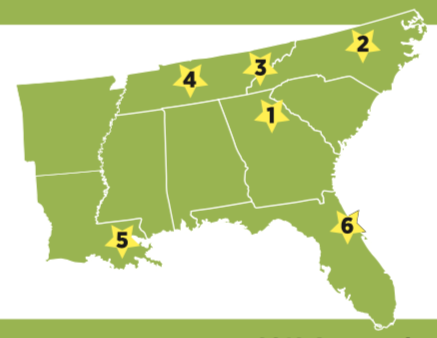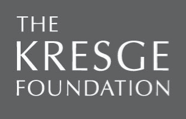The 2018 Southeast Sustainable Communities Fund Awards More Than $1.7M for Climate Change Projects in Six Southeastern Communities

2018 Communities
- “Community-Driven Neighborhood Climate Solutions” in Athens – Clarke County, Georgia
- “Adaptive Stormwater in the Walnut Creek Watershed” in Cary, North Carolina
- “Savings in the House 2.0” in Knoxville, Tennessee
- “Green Jobs for Home Energy Uplift” in Nashville, Tennessee
- “Using Front Yards to Address Flooding” in New Orleans, Louisiana
- “Community Resilience through Green Infrastructure” in Volusia County, Florida
Contact:
Meg Williams Jamison
SSCF Fund Manager
meg@southeastsdn.org
The Southeast Sustainable Communities Fund (SSCF) is pleased to announce that it will invest a total of $1,798,400 to support six sustainability projects in the Southeast. Projects are focused on implementing and scaling equitable solutions to the challenges associated with climate change, and are more pointedly addressing issues associated with water and/or energy. Funded for two years (2019 – 2020), projects will be shaped by community input and implemented by a collaborative of local governments and grassroots partnerships in each jurisdiction.
The SSCF is supported by the Southeast Sustainability Directors Network (SSDN), and philanthropic partners, The Kendeda Fund (www.kendedafund.org) and The Kresge Foundation (www.kresge.org). Partners developed the SSCF to provide needed resources for experiential learning and capacity building around sustainability in Southeastern communities. SSDN is a member led and member driven network of sustainability professionals who collaborate to solve problems, implement equitable solutions, and influence decision-makers in the South. The fund aligns with the network’s mission to accelerate and scale implementation of local government sustainability best practices in the region.


“COMMUNITY-DRIVEN NEIGHBORHOOD CLIMATE SOLUTIONS”
ATHENS – CLARKE COUNTY, GEORGIA
Investment: $300,000
Project Partners: Athens – Clarke County; Athens Land Trust; Athens-Clarke County Public Utilities; Georgia Interfaith Power and Light; New Urban Forestry; University of Georgia, Office of Sustainability; Athens-Clarke County Landscape Management Division; University of Georgia, Franklin College of Arts and Sciences
Project Summary: Community residents have developed a series of priorities for making Athens’ West Broad neighborhood more resilient to climate change. Project partners will work with the neighborhood to make their priorities a reality, and will take steps to lower energy and water utility costs, reduce the environmental impact of homes, and maintain tree canopies. Youth and community members will be trained to help in these efforts, equipping West Broad with the expertise to withstand environmental challenges and create a safer, healthier neighborhood.
“ADAPTIVE STORMWATER IN THE WALNUT CREEK WATERSHED”
TOWN OF CARY, NORTH CAROLINA
Investment: $300,000
Project Partners: Town of Cary; StepUp Ministry; NC State University Biological and Agricultural Engineering; City of Raleigh
Project Summary: This project focuses on increasing community resilience by testing new approaches to stormwater and floodplain management in the Walnut Creek Watershed, which extends from Cary, NC through Raleigh, NC. Work will focus on connecting residents, particularly renters and mobile home dwellers living in or near floodplains, with methods to increase resilience. This will include activities to build relationships with local government staff, connect residents with services offered by local non-profits and develop job training programs in the green infrastructure sector. The project increases resilience among the watershed’s most vulnerable residents, brings together partners to produce replicable and effective green infrastructure solutions, and provides a framework to work across jurisdictional boundaries.
![]()
“SAVINGS IN THE HOUSE 2.0”
CITY OF KNOXVILLE, TENNESSEE
Investment: $300,000
Project Partners: City of Knoxville; Alliance to Save Energy; Knoxville Utilities Board (KUB); Socially Equal Energy Efficient Development (SEEED); Knoxville-Knox County Community Action Committee (CAC); Tennessee Valley Authority; Knoxville-Knox County Emergency Management Agency; Shelton Group
Project Summary: Building on Knoxville’s successful energy efficiency education programs, this project will model innovative strategies to help local residents improve the efficiency, health, and resilience of their home. In addition to developing new education resources that address a more holistic set of topics beyond energy, local community partners will test new engagement activities designed to sustain resident interest in improving home sustainability & resiliency while building community cohesion.
![]()
“GREEN JOBS FOR HOME ENERGY UPLIFT”
CITY OF NASHVILLE, TENNESSEE
Investment: $300,000
Project Partners: City of Nashville; Nashville Career Advancement Center; Tennessee Valley Authority (TVA); Nashville Electric Service (NES); ClearResult; Nashville Promise Zone Partners
Project Summary: Partners will equip Nashvillians for jobs created through the Tennessee Valley Authority’s Home Energy Uplift (HEU) program. The program is focused on lowering utility costs for homeowners with low income, improving comfort, quality of life, and health impacts throughout the Valley. Nashville’s partnership will provide workforce training in energy retrofit installations and water efficiency measures and provide nationally-accredited certifications upon completion of training program, and connect participants to jobs created by HEU.
![]()
“USING FRONT YARDS TO ADDRESS FLOODING”
CITY OF NEW ORLEANS, LOUISIANA
Investment: $298,800
Project Partners: City of New Orleans, Urban Conservancy, Sustaining Our Urban Landscape (SOUL); Launch NOLA Green; Green Light New Orleans
Project Summary: New Orleans partners will prioritize green infrastructure projects in the Hoffman Triangle, one of the neighborhoods most vulnerable to repetitive flood loss, and also increase capacity of local community members to identify opportunities for green infrastructure in their neighborhoods. Connecting a green jobs training program, faith-based leaders and local community members, the project will use innovative tools to address stormwater and flooding issues, while at the same time scaling up highly effective green infrastructure retrofit techniques.
![]()
“COMMUNITY RESILIENCE THROUGH GREEN INFRASTRUCTURE”
VOLUSIA COUNTY, FLORIDA
Investment: $299,600
Project Partners: Volusia County, Center for Earth Jurisprudence; Spring Hill Resources Center (City of DeLand); Project H2O
Project Summary: In Volusia County, the Spring Hill community suffers from catastrophic inland flooding during heavy rain and storm events. These environmental challenges lead to health challenges, as Spring Hill residents constantly deal with stormwater pollution and mold. This project will address these challenges through implementation of large scale green infrastructure projects, community education, job training and placement, and local business development. These activities will equip Spring Hill residents to be more adaptive to climate change and economically resilient.